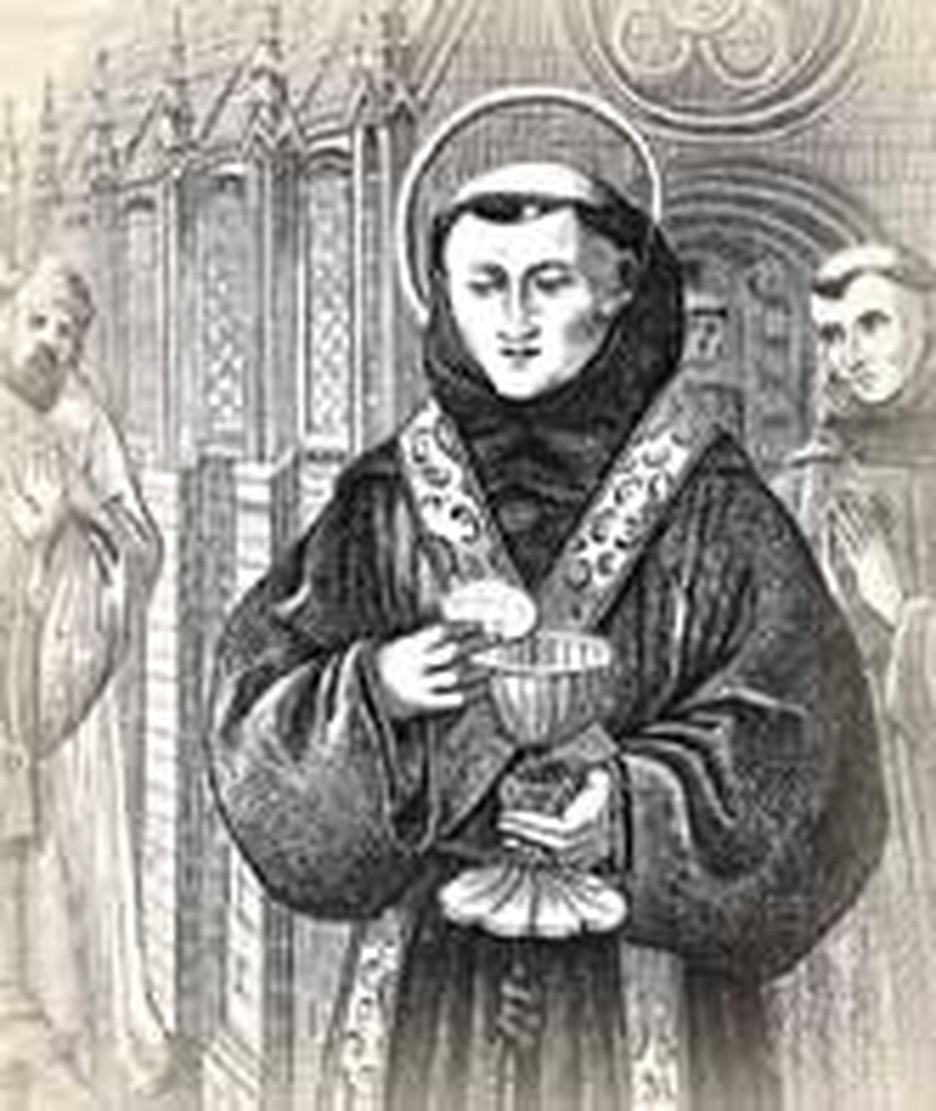
An often-told story from the Middle Ages says that some heretics refused to listen to St. Anthony of Padua. Rejected, he said he would go to the fish. They would listen to the gospel, he declared. Sure enough, down at the lake, the fish stood on their tails in the water and heard Anthony out. The astonished heretics became converts--and the story was painted again and again. Anthony must have been an unusually persuasive man for such an extraordinary tale to be accepted.
Born Ferdinand de Boullion, he took the name Anthony when he became a monk. The martyrdom of five priests by Muslims in North Africa filled him with longing to become a missionary. He, too, would spend his life for Christ! In Morocco, however, he fell seriously ill. For months he lay sick and was recalled to his native Portugal. A storm blew his ship off course and he found himself in Sicily. He proceeded to Italy.
1220 was the year of the Franciscans' fourth general chapter (an assembly). On May 30, Anthony, still weak, met St. Francis of Assisi. Francis approved the young monk's determination not to return to Portugal, which would have been an admission of failure. But none of the Franciscan houses wanted to take the sickly friar although Francis himself appealled to them. Finally, Anthony was assigned the lowly task of caring for six elderly lay brothers at Monte Paolo. In his spare time he prayed and meditated.
On March 19, 1221, his circumstances changed. Some new friars were to be ordained at Forli. Anthony attended. At these ordinations it was customary to present an address on the high calling of the priestly office. The responsibility fell to Anthony's superior, Father Gratian. Unprepared, he offered the honor to some visiting Benedictines, but they turned it down. So Gratian ordered Anthony to speak. Anthony protested. He was not prepared, he said. Recent experience had fitted him for the kitchen, not the pulpit.
Father Gratian would not accept "no" for an answer. He reminded Anthony that he had sworn an oath of obedience when he became a monk. Gratian assigned the text: "Christ became for us obedient unto death, even the death of the cross." Trembling, Anthony rose to obey. At first his voice was low. But as he spoke, it gathered strength. Those who heard him sensed the power of the Holy Spirit.
Never again did Anthony labor in obscurity. He was dispatched to Bologna, Toulouse, Montpellier, Florence, and Padua. Next to Francis, he became the most famous Franciscan preacher of that day. If even a few of the miracles attributed to him actually happened, they mark him as a man of extraordinary faith. It was asserted that on one occasion, every man heard him in his own language, just as at Pentecost. In a well-attested miracle, Francis, who was many miles away, appeared on the platform beside Anthony as he spoke. On another occasion, a wheat field, trampled by Anthony's listeners, was supposedly restored miraculously.
Anthony's teaching was lively: "Among his many titles, Christ is called a little child...You have hurt a child, you have struck him, but you show him a kindness, you give him a flower, a rose, or some other object he likes. Instantly, he forgets the hurt you did him, his anger is gone and he runs to embrace you. Thus it is with Christ. You have offended him by a mortal sin or wounded him by some fault, but you offer him the flower of contrition or the rose of a confession steeped in tears...At once he forgets your offense, he forgives your sin, he runs, he takes you in his arms and gives you the kiss of peace..."
Toward the end of his life, Anthony resided in Padua. He led revival there, speaking outdoors to crowds as large as 30,000. So holy was his life and so extraordinary the signs of power that attended it, that less than a year after his death in 1231 he was officially declared a saint.
Resources:
- Baring-Gould, S. Lives of the Saints. Edinburgh: John Grant, 1914. Source of the image.
- Bell, Mrs. Arthur. Saints in Christian Art. London: George Bell, 1901 - 1904.
- Curtayne, Alice. "Anthony of Padua, St." The Catholic Encyclopedia. New York: Robert Appleton, 1914.
- Huber, Raphael M. St. Anthony of Padua; doctor of the universal church. Milwaukee: Bruce Publications, 1948.
- Jameson, Anna. Legends of the Monastic Orders. London: Longman, Green and Co., 1872.
- Stoddard, Charles Warren. The Wonder Worker of Padua. Notre Dame, 1896.
- Vann, Joseph. Lives of the Saints. New York: John J. Crawley, 1954.








